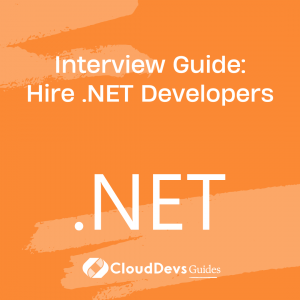Interview Guide: Hire .NET Developers
.NET development is widely used for building versatile applications across various platforms. Hiring skilled .NET developers is crucial to ensure the success of your projects.
Table of Contents
This comprehensive interview guide will help you identify top .NET talent and build a proficient development team.
1. Key Skills of .NET Developers to Look Out For:
Before diving into the interview process, take note of the crucial skills to look for in .NET developers:
- C# Proficiency: Strong knowledge of C# programming language, the backbone of .NET development.
- ASP.NET Core: Experience with ASP.NET Core for building modern web applications.
- .NET Framework: Familiarity with .NET Framework for developing desktop applications and services.
- Database Management: Knowledge of SQL Server or other databases for efficient data storage and retrieval.
- RESTful APIs: Proficiency in building and consuming RESTful APIs for seamless integration with other systems.
- Front-end Technologies: Understanding of front-end technologies such as HTML, CSS, and JavaScript for web application development.
2. An Overview of the .NET Developer Hiring Process:
- Defining Job Requirements & Skills: Clearly outline the technical skills and experience you are seeking in a .NET developer, including C# proficiency, ASP.NET Core knowledge, and database management expertise.
- Creating an Effective Job Description: Craft a comprehensive job description with a clear title, specific requirements, and details about the projects the developer will work on.
- Preparing Interview Questions: Develop a list of technical questions to assess candidates’ .NET knowledge, problem-solving abilities, and experience in building applications.
- Evaluating Candidates: Use a combination of technical assessments, coding challenges, and face-to-face interviews to evaluate potential candidates and determine the best fit for your organization.
3. Technical Interview Questions and Sample Answers:
Q1. Explain the difference between .NET Framework and .NET Core. When would you use each?
Sample Answer:
.NET Framework is the traditional Windows-based development framework, while .NET Core is a cross-platform and open-source framework. .NET Core is ideal for building modern web applications that need to run on different platforms, including Windows, Linux, and macOS. On the other hand, .NET Framework is suitable for Windows-specific desktop applications and services.
Q2. How do you handle exceptions in C#? Provide an example of custom exception handling.
Sample Answer:
In C#, we handle exceptions using the try-catch block. Here’s an example of custom exception handling:
try
{
// Some code that may throw an exception
}
catch (CustomException ex)
{
// Handle the custom exception
Console.WriteLine("Custom Exception: " + ex.Message);
}
catch (Exception ex)
{
// Handle other exceptions
Console.WriteLine("Generic Exception: " + ex.Message);
}
Q3. Explain the concept of dependency injection in .NET Core. How does it promote loosely coupled code?
Sample Answer:
Dependency Injection (DI) is a design pattern used in .NET Core to achieve loose coupling between classes. With DI, the dependencies of a class are injected into it rather than creating them within the class itself. This makes it easier to replace dependencies with different implementations without modifying the class that uses them. The built-in DI container in .NET Core handles the resolution and injection of dependencies.
Q4. How do you implement authentication and authorization in ASP.NET Core? Provide an example of role-based authorization.
Sample Answer:
In ASP.NET Core, we implement authentication using middleware and ASP.NET Core Identity. For role-based authorization, we assign roles to users and authorize actions based on those roles. Here’s an example
[Authorize(Roles = "Admin")]
public IActionResult AdminDashboard()
{
// Action code for the Admin dashboard
}
Q5. Explain the concept of asynchronous programming in C#. How does it improve the performance of applications?
Sample Answer:
Asynchronous programming in C# allows us to execute non-blocking operations concurrently, improving the responsiveness and performance of applications. With async/await keywords, we can write asynchronous code that doesn’t block the main thread. As a result, the application can perform other tasks while waiting for the asynchronous operation to complete, reducing idle time.
Q6. How do you use LINQ (Language Integrated Query) in C#? Provide an example of querying a collection using LINQ.
Sample Answer:
LINQ is a powerful feature in C# that allows us to query data from collections, databases, or other data sources using a consistent syntax. Here’s an example of querying a collection using LINQ:
List<int> numbers = new List<int> { 1, 2, 3, 4, 5 };
var evenNumbers = numbers.Where(n => n % 2 == 0);
foreach (var number in evenNumbers)
{
Console.WriteLine(number);
}
Q7. How do you handle concurrency and thread safety in C#? Explain the use of locks and the lock keyword.
Sample Answer:
In C#, when multiple threads access shared resources concurrently, we must ensure thread safety to avoid race conditions and data corruption. We use locks to protect critical sections of code. The lock keyword in C# ensures that only one thread can enter the locked code block at a time, preventing multiple threads from modifying shared resources simultaneously.
Q8. Explain the concept of web services in .NET. How do you consume a web service in a .NET application?
Sample Answer:
Web services in .NET allow applications to communicate and exchange data over the internet. .NET provides built-in classes and tools, such as HttpClient, to consume web services. We can make HTTP requests to the web service endpoints, and the response can be parsed and used in the application.
Q9. How do you implement caching in .NET applications to improve performance? Explain different caching mechanisms available in .NET.
Sample Answer:
Caching in .NET helps improve application performance by storing frequently accessed data in memory, reducing the need for repetitive computations or database queries. In .NET, we can use built-in caching mechanisms like MemoryCache for in-memory caching and DistributedCache for distributed caching, which allows sharing cache data among multiple servers.
Q10. Explain the role of the Global Assembly Cache (GAC) in .NET. When and why would you deploy an assembly to the GAC?
Sample Answer:
The Global Assembly Cache (GAC) in .NET is a central repository for storing shared assemblies that can be accessed by multiple applications. We deploy an assembly to the GAC when we want to share it across multiple applications on the same machine without copying it to each application’s bin folder. Assemblies deployed to the GAC must have a strong name to ensure uniqueness and prevent conflicts.
4. The Importance of the Interview Process to Find the Right .NET Talent:
The interview process is essential for identifying skilled .NET developers with the right expertise to meet your project requirements. .NET development involves diverse aspects, including web application development, desktop applications, and service-oriented architectures. In-depth technical interviews help assess candidates’ problem-solving abilities, familiarity with .NET frameworks, and experience in building scalable applications.
5. How CloudDevs Can Help You Hire .NET Developers:
Finding top-notch .NET developers can be challenging, but CloudDevs simplifies the process for you. By leveraging CloudDevs’ extensive network of pre-screened senior .NET developers, you can build a high-performing development team with ease.
Here’s how CloudDevs can assist you:
- Discuss your project needs and required skill sets with a dedicated consultant.
- Receive a curated shortlist of top .NET developers within a short period.
- Conduct technical interviews and coding assessments to evaluate candidates’ proficiency.
- Start a risk-free trial with your selected .NET developer to ensure a perfect fit for your projects.
With CloudDevs, you can assemble a competent .NET development team and focus on creating robust and feature-rich applications. Rely on CloudDevs’ expertise to streamline your hiring process and embark on your .NET development journey confidently.
Table of Contents









